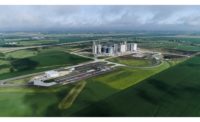Toray Plastics (America), Inc. has announced that the Toray Commons in the University of Rhode Island’s new $125 million Fascitelli Center for Advanced Engineering officially opened during a ribbon cutting on October 7, 2019. The new building, with its soaring glass walls and enormous expanses of open space, is designed to enhance collaboration among faculty and students across all engineering disciplines. The Toray Commons is a 6,200-square-foot, natural-light-filled gathering place that includes an information kiosk and café and is open to the entire URI community. In 2014 Toray pledged $2 million toward the construction of the new, 190,000-square-foot complex.
The grand opening of the Fascitelli Center was attended by more than 400 people. Raymond M. Wright, dean of the College of Engineering, welcomed guests, and David M. Dooley, president of the College, offered greetings. Mr. Kei Shimaji, chief representative for Americas, Toray Industries, Inc., president, Toray Industries (America), Inc., Mike Brandmeier, president of Toray Plastics (America), and other Toray employees also attended the event.
Brandmeier opened his remarks by acknowledging the support of Toray Industries and congratulating Dean Wright on his vision for the new engineering school and ability to bring the project to fruition. He then said, “Toray is extremely proud of its relationship with URI,” and noted that it has invested more than $4 million in the university, that 57 URI graduates are currently employed at Toray, and that every year the company offers internships to URI students.
“We view the investment in URI the same way we view our Capital Investment Plan. That is to say, we are making a long-term strategic decision, one driven by an absolutely overwhelming imperative which is that we need the best people we can find to run our business. For us, the new College of Engineering is a long-term bet, one which we believe will pay off hugely for us as the future unfolds.”
The URI’s College of Engineering has five departments and offers eight undergraduate degree programs. Students may study engineering in the following areas: chemical, biomedical, civil and environmental, electrical, computer, mechanical industrial and systems, international, and ocean. Master’s and Ph.D. degrees are also offered in certain areas.




